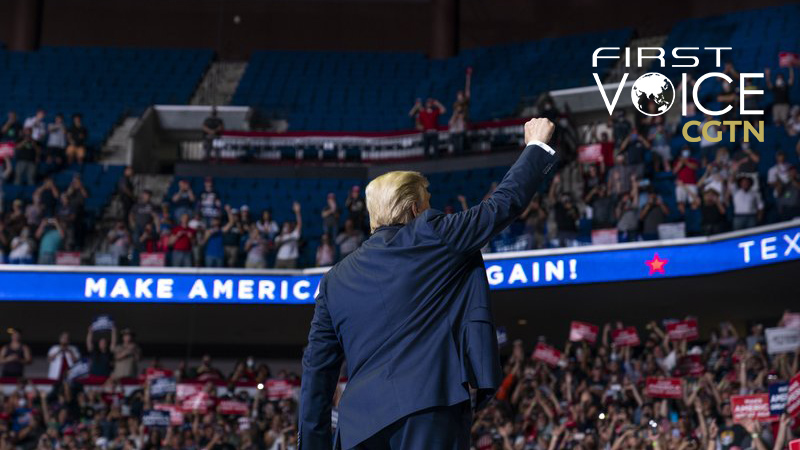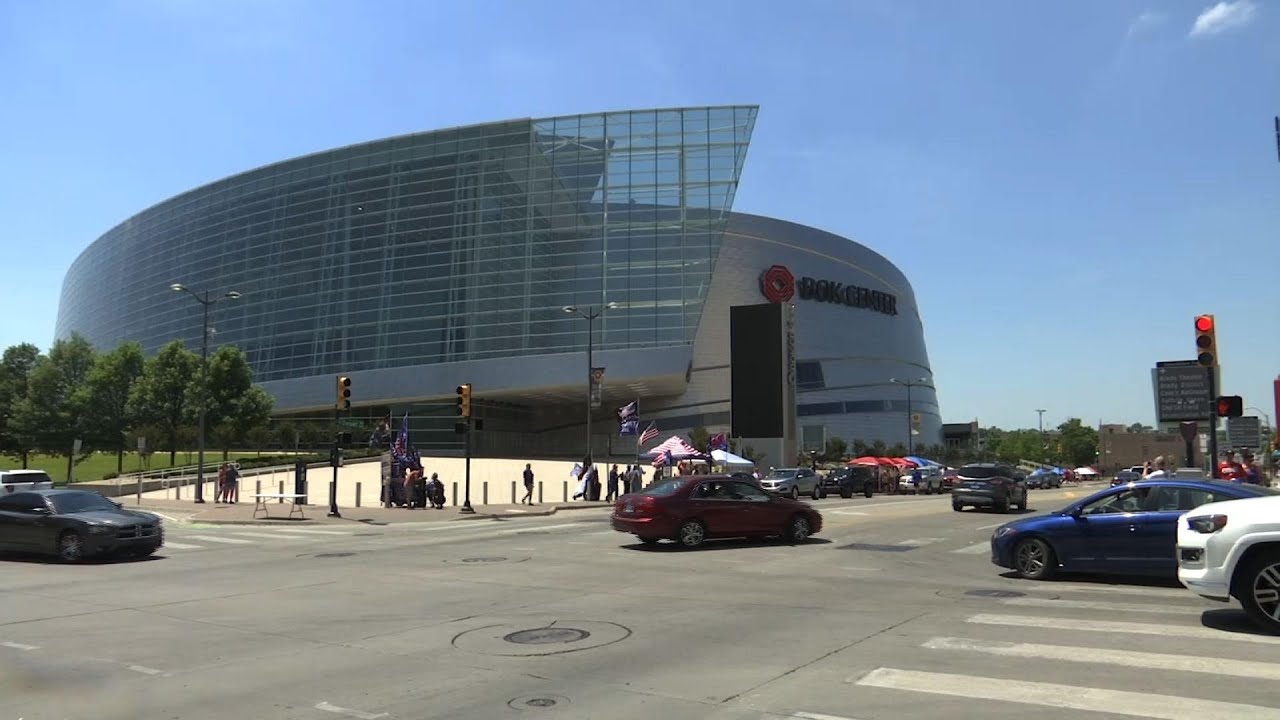
President Donald Trump speaks at a campaign rally at BOK Center in Tulsa, Okla, June 20, 2020. /AP
President Donald Trump speaks at a campaign rally at BOK Center in Tulsa, Okla, June 20, 2020. /AP
Editor's note: CGTN's First Voice provides instant commentary on breaking stories. The daily column clarifies emerging issues and better defines the news agenda, offering a Chinese perspective on the latest global events.
On June 20, Trump held his first re-election campaign in months at a 19,000-seat stadium in Tulsa, Oklahoma. Despite his campaign's claims that more than a million people had sought tickets, the president was greeted with an audience of a much smaller scale – a third of the stadium's seats were left empty.
The rally happened at a time when the country was still reeling from the ravages of the pandemic. The situation in Oklahoma has not stabilized either. On June 18, its daily new cases reached 450, the second-highest since the outbreak started in the state. Medical experts and the media have all warned against holding the event. The Los Angeles Times, for example, published an article on June 20, asking "Will asymptomatic spread turn Trump's Tulsa rally into a COVID-19 party?"
In a way, the president's insistence on reviving his re-election campaign has reflected his growing anxiety with his dimmed re-election prospect, said Zhao Hai, an assistant researcher in American politics at the Chinese Academy of Social Science.
The latest Gallup poll on his approval rating, having dropped to 39 percent from 49 percent in late March, reflects the deepening public dissatisfaction toward the president. Joe Biden has managed to gain an edge over him, leading him 50.5 percent to 41.3 percent in the national polls, according to the polling website fivethirtyeight.com.
This is, however, no surprise. Since the beginning of this year, Trump's presidency has suffered some major blows. His response to COVID-19 has proved shockingly incompetent and negligent and partly led to the infection rate in the U.S. shooting to two million in the course of the past four months, the highest in the world. Despite this, he is still in vehement denial of any responsibility. During the rally, he even made the jarring comment that he had asked officials to "slow testing down" so that the number could be kept lower. In the typical Trump style, he also used racist terms to refer to the coronavirus as "Chinese Virus" and "Kung Flu," disregarding any damage such terms might do to the American Chinese community.

Some supporters of President Donald Trump start gathering outside the Tulsa, Oklahoma, arena that will host his first campaign rally during the coronavirus pandemic two days before the actual event. /AP
Some supporters of President Donald Trump start gathering outside the Tulsa, Oklahoma, arena that will host his first campaign rally during the coronavirus pandemic two days before the actual event. /AP
His "fire and fury" reactions to the burgeoning anti-racism protests across America have been another major source of agitation for many Americans. Instead of addressing the real issue of racism entrenched in the American society or expressing sympathy with the protesters' cause, he has framed the issue as caused by the radical left and repeatedly threatened to crack down on the lawful demonstrations. This time around, however, unlike during the 2016 election campaign, portraying the president himself as safeguarding and representing "law and order" did not do him any favors. Instead, it has pitted him against people and dampened his public support, said Sun Chenghao, an assistant research professor on American Studies at the China Institutes of Contemporary International Relations.
Although experts mostly agree that the June polling is not necessarily an accurate prediction of the final re-election result, there is sufficient ground to believe that Trump's chance of getting re-elected has dimmed considerably in the wake of these political crises. Notably, even in the swing states of Florida, Pennsylvania and Missouri, as the recent developments show, Biden has currently led Trump by five to six percent, Sun said.
Nevertheless, there are still over four months until the re-election takes place. How voters are going to vote is still subject to what happens next. Biden's health and whether there will be any scandals involving him in the next few months are still unknown factors that could weigh on the final results, according to Sun. In 2016, scandals implicating Hillary Clinton in the lead up to the November election, particularly the FBI's decision to look into the newly discovered emails associated with her case days ahead of the election, had a damning effect on her unexpected defeat.
Furthermore, the surprising results of the 2016 re-election, going against polling results, also warrants caution against being too dependent on the polls. Zhao noted that during Trump's presidency, his approval rating, which has been largely sitting between 35 percent and 45 percent, has not been hugely susceptible to how mainstream media covered controversies surrounding him. He attributes this to the rising influence of social media in the U.S. and the country's deeply polarized and charged political climate where staunch Trump supporters are likely to ignore any criticism leveled against the president. Therefore, despite the fiasco concerning the administration's handling of the pandemic, Trump supporters are still more likely to blame, say China, rather than the U.S. president's own negligence. This group of people may not easily change their minds about who they vote for when they head to the polls this November.
With the much-anticipated 2020 presidential election four months away and ample reasons for Trump to worry, it is still uncertain what is in store for Americans when the 2020 election results are announced later this year.
Scriptwriter: Xu Sicong
(If you want to contribute and have specific expertise, please contact us at opinions@cgtn.com.)